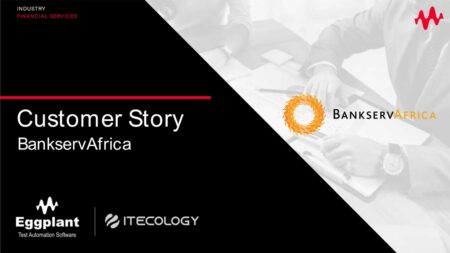 In our first article of this series on e-commerce, we discussed the pressures that retailers are under to deliver an exceptional online experience. In the second article, we explored the reasons behind the current failings that are still prevalent in a broad spectrum of e-commerce websites.
In our first article of this series on e-commerce, we discussed the pressures that retailers are under to deliver an exceptional online experience. In the second article, we explored the reasons behind the current failings that are still prevalent in a broad spectrum of e-commerce websites.
Despite significant investment and the adoption of more agile approaches, almost every online retailer experiences issues. If we consider that 63% of consumers said they were unlikely to return to a website after a poor experience (Radware) or that a delay of just one second in page load time can result in a 7% loss in conversions (Akamai Technologies), our work is clearly cut out for us.
In this article, the latest in the series, we unpack three approaches to addressing these issues.
Unlock the full potential of your business through observability
Lord Kelvin, over a century ago, rightly stated that “if you can’t measure it, you can’t improve it”. Is it any surprise then, that the Holy Grail of business has been to establish wide-ranging and deep insight into every facet of business processes? Observability should therefore be a core focus of any retailer looking to succeed in the over-subscribed e-commerce landscape. Observability should today not only relate to the consolidation of data around social media sentiment, business metrics, user experience metrics and site metrics (location, device, operating system, bounce rate, etc) but also the ability to intelligently analyse and provide actionable information to business and IT.
Historically, the challenge has been one of tying together all these metrics across varied sources, technologies and processes. Today, however, solutions exist that allow the previously unrealistic objective to be attained with relative ease. One such solution is Dynatrace, which incorporates unparalleled deep insight with cross-functional observability. Correctly applied, observability will not only provide real-time insights but guide various teams across infrastructure, application and business in their efforts to continually improve their user experience.
Embrace automation for a smarter tomorrow
Automation is a vital tool for online retailers to improve the user experience of their websites, including pipeline automation with quality gates and test automation with robotics where required. By using automated testing, retailers can quickly and efficiently test various aspects of their sales process, including its functionality, usability and performance. This allows retailers to identify and fix any issues before they negatively impact the user experience. How many retailers struggle with ensuring that their:
- Listings are complete;
- Platform supports the myriad combinations of devices and operating systems;
- End-to-end, omnichannel purchase process is optimised (this can include third-party integrations such as 3D-secure that force customers to validate transactions outside of the retailer’s application environment and across different platforms as part of a single purchase);
- Pricing is competitive and in line or better than their competition; and
- Inventory control across physical stores and the online platform is accurate?
Today, solutions such as Keysight’s Eggplant testing solution allow all the above to happen, irrespective of technology or device, across the landscape – and to do so in a manner that integrates with any agile delivery approach. Guided and coupled with observability, these tests are focused and immediately identify performance bottlenecks.
Secure your shopping journey, protect your customers’ peace of mind
The recent breach of LastPass is a clear indicator that even the most security-conscious organisations are vulnerable. What is even worse is the manner in which the breach was ultimately reported to the user community, an approach that diminishes consumer confidence and trust.
Retailers need to adopt a proactive security-by-design approach, rather than one that is reactive. Security should be part of the requirement of any online presence and therefore be baked into the design, architecture and code. Security is then validated at every step of the development lifecycle starting with source-code analysis on a developer’s IDE, scanning code inside the IDE and guiding developers to code more securely.
This is followed by dynamic scanning of the build in a suitable test environment and completed by software composition analysis in test and production environments.
Lastly, communicate your approach to security to users because users are increasingly exposed to large-scale breaches and will continue to look for reasons to build trust with brands. And please, for the love of your customer, be open and transparent!
In conclusion
Automation and observability are powerful tools that online retailers can use to improve the user experience of their website. By testing various aspects of the website, including its functionality, usability, performance and security, retailers can ensure that their website is reliable, efficient and secure for all customers.
By observing all elements of infrastructure, application, customer and business, retailers can respond appropriately to any issues that could lead to customer abandonment. This ultimately leads to increased customer satisfaction and sales.
What are we offering?
If you are exploring options to improve your e-commerce experience, IT Ecology will provide two senior consultants (with over 40 years of combined quality assurance experience) to the first six respondents to facilitate a one-day workshop with your team. Contact us to book your workshop.
To find out more about how we can help improve your customer’s online experience, feel free to contact IT Ecology.
About IT Ecology
Founded in 2004, IT Ecology made it its mission to provide technical testing and monitoring competencies to the sub-Saharan African market. The company excels at delivering against unique customer requirements. Customers call upon IT Ecology as the solution thinkers and advisers. Coupled with a can-do attitude, our team has delighted our customers, again and again, exceeding their expectations. For more information, visit www.itecology.co.za, or connect on LinkedIn.
- This promoted content was paid for by the party concerned




